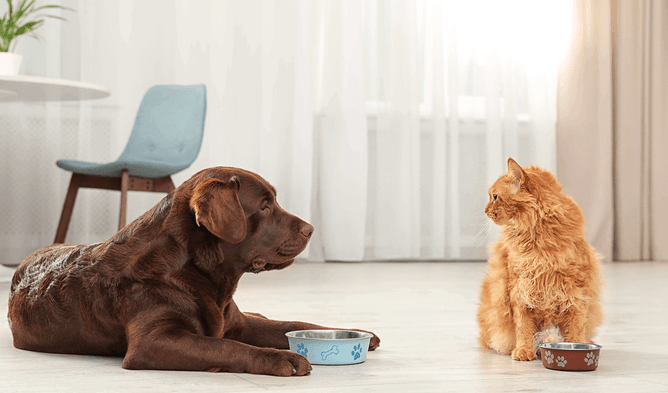When feeding your beloved pet, whether it be a new puppy or kitten, or an older cat or dog, there is such a thing as ‘loving them too much’. Overindulging your pet can lead to health problems if they become overweight, so knowing how much, how often, and what to feed them is important.
Pet food bags have feeding guides on the back which help you with the ‘how much’. This healthy amount of food can be tailored to suit your pet and could be split up into many feeds throughout the day, depending on their needs.
Things to watch out for:
Spayed or neutered pets are more likely to feel hungry more often and gain weight more easily. This quite commonly leads to overfeeding.
Below is some advice on how to feed your pets:
Puppies
Puppies grow very rapidly and require the right amount of food for their weight. Feeding them a high quality puppy food from the start is key to supporting their healthy growth.
A small breed puppy, such as a fox terrier or a maltese, should be fed small breed puppy food, while a large breed dog, such as a German shepherd or huntaway, needs a large breed puppy food.
How often should you feed a puppy?
Age | Frequency |
|---|---|
8-16 weeks | 3-4 times a day |
16 weeks + | Slowly reduce to 2-3 times a day |
Our clinics supply a wide range of foods that are tailored to many sizes and breeds of puppies.
Adult dogs
There are many different foods available for adult dogs, covering a variety of needs. For instance, a dog that is more susceptible to pancreatitis may need a low fat food that is easier to digest, while a working dog can benefit from the higher calories found in working dog food.
There are always biscuits available for small breed adults and large breed adults as well.
How often should you feed an adult dog?
Dog type | Frequency | Time of day |
|---|---|---|
Working dog | Usually once a day | Often in the evening when they have finished work to avoid bloat |
Pet dog | 1-2 times a day | Morning and evening |
It is a good idea to regularly weigh your dogs to ensure you feed them the appropriate amount. You can always bring them into a clinic for a quick hop on the scales.
Kittens:
High quality kitten food is important to support the growth of your new fur baby. Veterinary clinics supply a wide range of foods that are tailored to each individual taste. It is possible to buy breed-specific food, although a standard high quality kitten food works just as well.
How often should you feed a kitten?
Age | Frequency | Food type |
|---|---|---|
8-16 weeks | 4 times a day | Dry food/biscuits |
16 weeks+ | Slowly reduce to 3 times a day and then twice a day | Dry and wet food |
The amount of food your kitten needs will, again, depend on its weight. Both biscuits and wet foods will have feeding guides based on weight. Be careful not to double up your kitten’s daily intake if providing dry and wet food.
Adult Cats
Adult cats are the same as kittens, however, the amount you feed them will be increased.
Cats prefer to come and go from their food, so adlib feeding biscuits is a great way to teach them that once they finish their biscuits, that's all they get for the day. This is especially useful if you have a cat that doesn't do a lot of exercise and tends to put on weight a little easier.
Sometimes, feeding a little bit less or encouraging them to play with toys to get their food can be a rewarding way for your cat to stay active and still eat their recommended amounts of food.
There are a wide range of biscuits and wet foods available for cats, including those that are overweight (metabolic food), or have other health concerns (for instance, cats with urinary crystals can be fed urinary food).
It is also important to keep up to date with your cat's health checks and weight to ensure they are fed the correct diet.
Veterinary clinics provide a wide range of foods to cater for both standard and specialist diets. It is so important to ensure animals are fed age, stage and breed-appropriate food, and in the right quantities, to keep them healthy. Speak to our friendly teams in the clinic for more advice on which food is right for your pet, or better yet, book them in for a health check!

